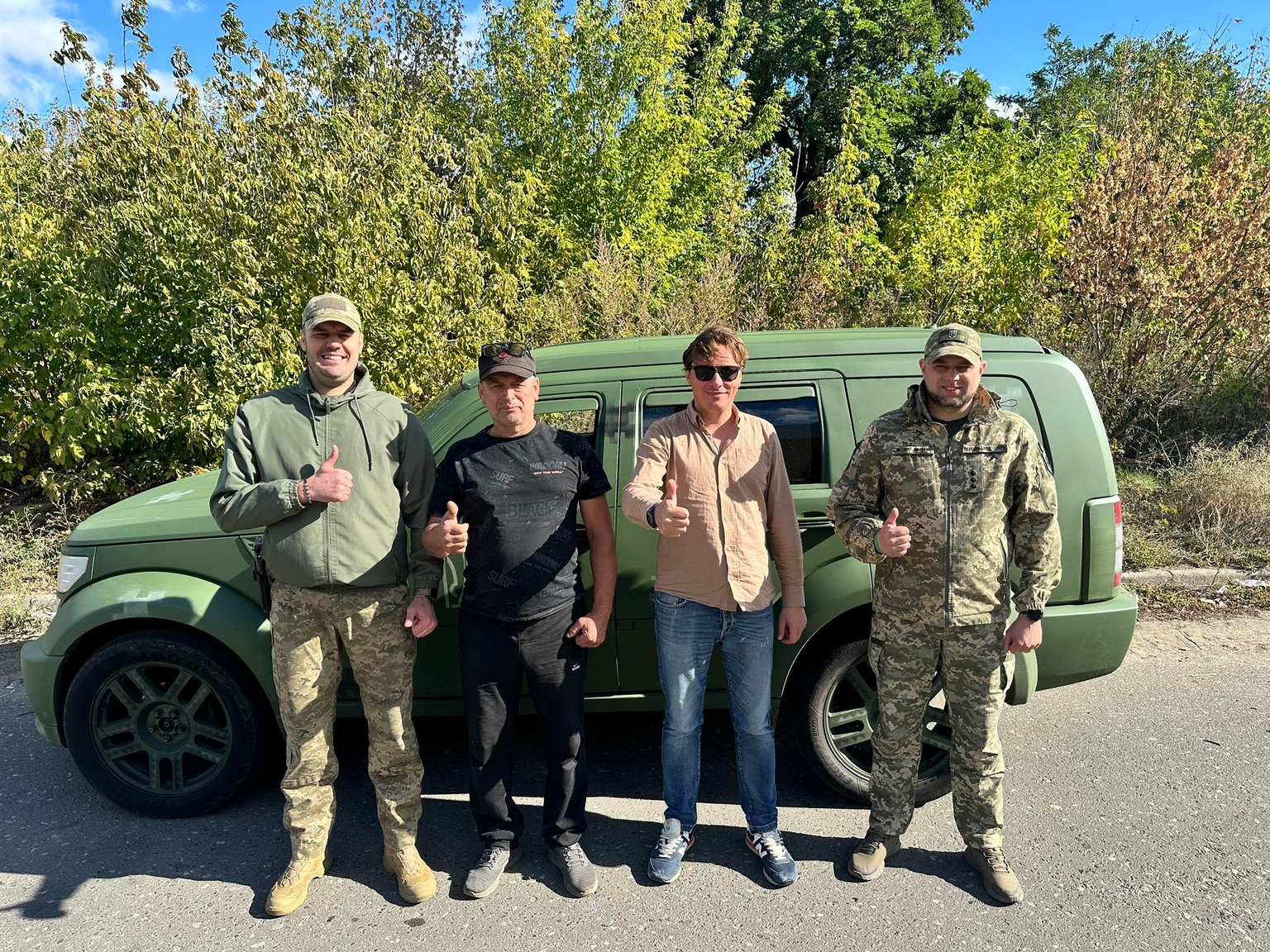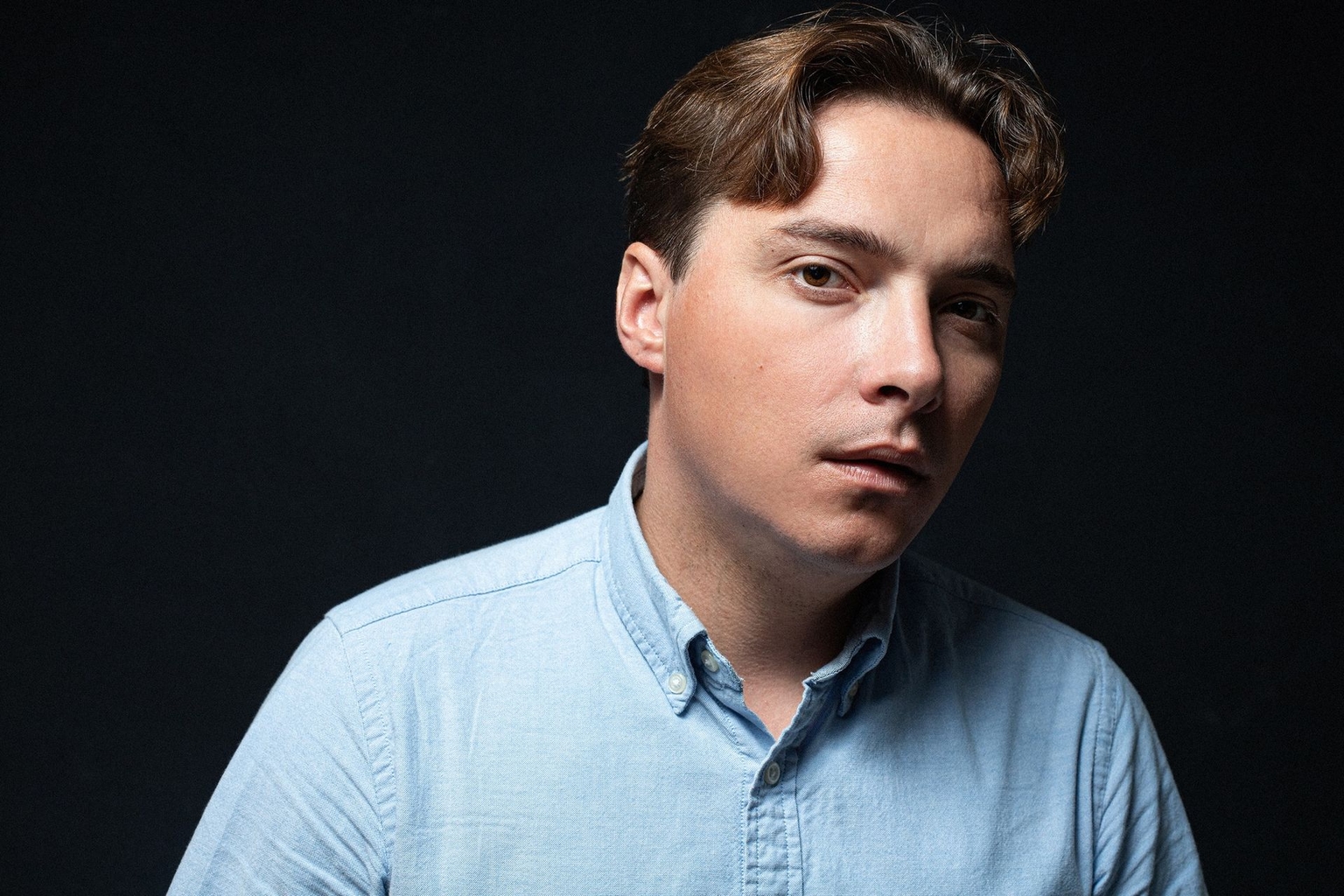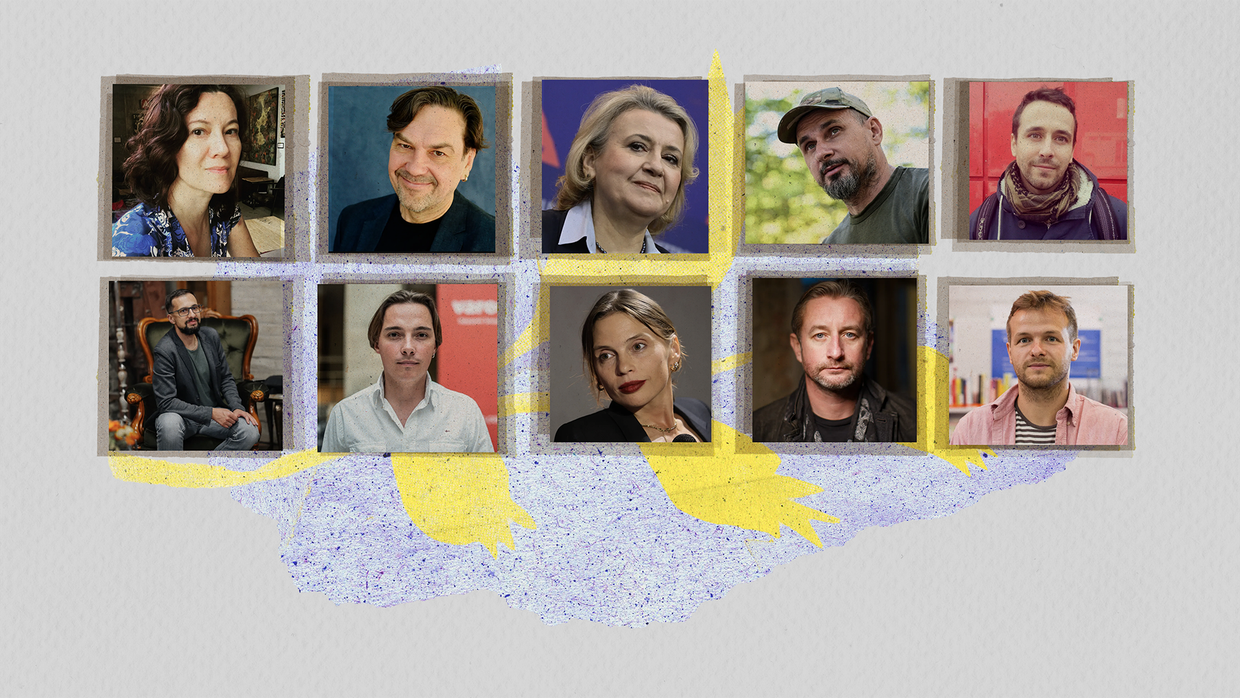'Bring Ukraine more weapons' — author Andriy Lyubka on cultural diplomacy's main wartime role

Ukrainian writer and translator Andriy Lyubka during Meridian Czernowitz 2023 in Chernivtsi, Ukraine, in September 2023. (Julia Weber)
When the full-scale invasion began, Andriy Lyubka struggled to write. A celebrated Ukrainian writer and translator, he turned instead to fundraising, logistics, and delivering used cars to the front for soldiers' needs.
Yet somewhere between non-stop volunteer work and battling with exhaustion that comes from it, he began to see that even literature — words, sentences, imagination — could also serve Ukraine's cause, albeit in a less immediate way.
His volunteer work led him to write a book of anecdotal essays titled "War from the Rear," in which he reflects on volunteering, the unexpected help he has gotten from people along the way, and how the full-scale war changed his outlook on life. The book will be released in English translation by Academic Studies Press this November. Kate Tsurkan, who conducted this interview, was involved in the English translation.
His debut novel, "Carbide," about a drunken history teacher who naively enlists the help of local criminals to dig a tunnel into the European Union and smuggle all 40 million-plus Ukrainian population into Europe, was published by Jantar in English translation in 2019.
Now, with the recent release in Ukraine of his first novel since the start of the all-out war, Lyubka reclaims the act of storytelling not as escape, but as strategy.

He insists that Ukrainian writers when traveling abroad now carry a clear and singular mission: to "bring Ukraine more weapons." It's a statement that may sound jarring to some, but for Lyubka, art is part of the country's defense infrastructure — it's cultural diplomacy that must yield tangible results.
Speaking with the Kyiv Independent, Lyubka reflects on returning to fiction again, why he wanted to write a Ukrainian story with a happy ending, and how the role of the writer — once bohemian, now tactical — has transformed into something both heavier and more urgent.
This interview has been edited for length and clarity.
The Kyiv Independent: Your new novel "Night in Istanbul" was recently released in Ukraine, and it's the first you've written since the start of Russia's full-scale invasion. What was it like for you to return to fiction?
Andriy Lyubka: I originally told myself I wouldn't write until the war was over. Then writing nonfiction saved me from depression in 2023. I felt that I could still write, and that I hadn't turned into some kind of mechanic from my ongoing procurement of cars for the military. Part of my identity was preserved, I still knew how to do this — I just didn't have the time.
And later, at the start of 2024, I wrote an essay that was published simultaneously in 21 countries. It was written for the anniversary of the full-scale invasion. Then I felt a deep sense of satisfaction, because when that text began to resonate in many different languages — from Greek to Swedish — it felt to me as though I had won a small victory.
Then, I ended up breaking my leg, and in hindsight, it was a small miracle. I wasn't deeply upset — it was difficult, but I recognized it as a unique opportunity for a writer: a kind of creative residency at home, when you can't go anywhere, do much of anything, or even move freely around the house. Still, I managed to reclaim my identity and become a writer again. It was a really cool experience. While writing that last novel, I felt something I hadn't felt in a long time — the pure joy of writing, as exhilarating as playing a great game.
The Kyiv Independent: The opening line of your new novel immediately pulls the reader in, as the narrator declares: "I was recruited so skillfully that I didn't even realize I had become an agent of the Ukrainian secret services." Were you trying to be provocative by invoking the SBU?
Andriy Lyubka: No, I wasn't. Security services — how they gather information — are often thought of as shrouded in secrecy. In reality, it's largely about analytics and information gathering. At its core, the security services are built on analysis. When you have information — especially exclusive information — and can connect multiple factors to draw meaningful conclusions, only then does the next phase begin. For example, an operation may follow, but it typically unfolds quickly. In other words, it's just a small part of the larger work that needs to be done for something like that to happen.
The first time I was interrogated by the security service was in 2006. I was a student and had just been freed from 15 days in a Belarusian prison (after taking part in protests there and helping to advise the opposition during elections). A Ukrainian counterintelligence officer tracked me down, and we met for coffee. He was very polite, and it wasn't until an hour into our conversation that I realized I was being interrogated.
I thought we were just talking and that he wanted to learn something, and so on — but only later did I understand that he was actually checking some details. Later they were even documented, but what they were interested in was whether, since I was a young man — I was 19 years-old at the time — whether they had tried to pressure me into being recruited, whether I had become a Belarusian agent.
It was almost a comedy. A Belarusian agent in Uzhhorod — a student! But they were doing their job, and that's a world that has always interested me.
I've read a lot of spy literature, and I've been particularly interested in the role of writers as spies. We know about Ian Fleming, of course, but in fact, the classic of the genre is still considered to be the work of W. Somerset Maugham.
He was a man who had a unique cover story for working in intelligence, because he was playing himself — a writer who travels the world, meets different people. But at the same time, he was someone who could, first of all, meet people on neutral ground, gather information, lend a hand, and so on.
He could observe and collect information. In short, it's something with deep roots. And I really wanted this theme of espionage to find its proper place in Ukrainian literature.
The Kyiv Independent: What were your goals when writing this book?
Andriy Lyubka: We write a lot about important things. I believe Ukrainian literature carries an almost innate trauma — a compulsion to always address what matters. Certain topics feel unavoidable, as if it's an obsession, and nothing else will do.
At the same time, we often discuss mass culture and how simplicity can sometimes be more effective than complexity. In my own work, I aimed to achieve three things. You could say these goals aren't purely literary, but they aren't strictly political either.
First, I wanted to show the image of a successful Ukrainian. Not a Ukrainian who suffers, who experiences loss, who fails, or who tries but is still broken by fate.
Everything — your actions, your words, your work, even how you present yourself — must serve the purpose of Ukraine's war effort.
I wanted to make it easy to read — something accessible to a mass audience, something that, so to speak, could be made into a film, something a taxi driver could read, not just a university professor. I wanted the imagery to be appealing and captivating, while still respecting the laws of the genre and its specific conventions.
My main goal — one I felt viscerally and considered deeply important — was this: for the first time in my life, I experienced a feeling where I hadn't even begun writing the book yet, but I already knew it would have a happy ending.
I wanted to write a Ukrainian book with a happy ending. While we can tell many kinds of stories, Ukrainian literature often leans toward tragic finales. I wanted a story where a Ukrainian faces trouble, overcomes numerous obstacles, and ultimately triumphs. He survives, succeeds, and completes his mission.
And I think it's about creating something new — introducing a different possibility into the story. Not just another attempt to evoke empathy by showing how much the hero suffered, how remarkable he was, and then how tragically he died. Rather, it's about creating an entirely different model — one where the hero is strong, he succeeds, and he lives on.
The Kyiv Independent: How has the war changed your attitude and philosophy toward writing? If it has at all.
Andriy Lyubka: Before, I was, let's say, a young poet — quite a provocative one — someone with a sort of bohemian lifestyle, and that all felt natural. I grew up within a certain circle of modernists, and it seemed to me that literature was one big carnival.
Now I approach what I do and what I say with much greater caution. I've developed a strong sense of responsibility. In the past, whether at the Frankfurt Book Fair or elsewhere, whenever I arrived somewhere, I was primarily representing myself. I'd be introduced as a writer — 'this is what I write, this is my rhythm,' and so on.
But now, I no longer represent just myself. In most cases, what I say — and the books I've written — represent Ukraine as a whole. And you have to be very careful, knowing how easily things can be interpreted one way or another, and how that can harm our shared efforts.
Realizing that your hand is small — very small — but that a single careless word could worsen our struggles makes you grow up fast. You begin to weigh your words carefully, to shape your ideas, and decide on the few key messages you want to convey, much earlier than before. It's no longer about simply showing up, taking the mic, and saying whatever comes to mind.
These are things you prepare for. And in that sense, I think all of Ukrainian society has grown up. And I understand cultural diplomacy, if we're talking about it, in a very practical way.
It seems to me that we often talk a lot about literature — about genres, about every book, about the classics we should teach. And that's all good. But in my view — and this is my firm conviction — what is the function of Ukrainian literature abroad today? To bring us more weapons.
The true purpose of Ukrainian literature abroad isn't just to make our names known or to enter certain cultural spaces — that's important too — but above all, our work should help Ukraine secure more weapons and aid in the fight against Russia.
We do this in different ways: by persuading our audiences, seeking support, building direct connections, and so on. But that's the main goal.

Figuratively speaking, every Ukrainian writer who goes to Frankfurt should come back with at least one Stinger, at least one rocket. That's how it should work. In ten years, it will yield different results.
Cultural diplomacy works over the long term, across generations. It's not about doing something today and seeing results tomorrow. Of course, in ten years, when we have a substantial body of translated texts, new genres, translators, and networks of publishers and writers, we'll focus more on promoting literature itself.
For now, the goal is practical. Everything — your actions, your words, your work, even how you present yourself — must serve the purpose of Ukraine's war effort.
The Kyiv Independent: Dark humor plays a prominent role throughout your work. I can't help but recall a particular scene from your book "War from the Rear," about your wartime volunteering, where you and your fellow volunteers prank a famous Ukrainian soccer player by making him believe he has to transport the body of a fallen soldier from Donbas. Why do you think it confuses and unsettles so many people that we can laugh during a war?
Andriy Lyubka: I say this slightly in jest, but possessing a good sense of humor is essential. For example, that text you mentioned — an Australian literary magazine wanted to publish it. There wasn't even a translation yet. I told them I had a text — an essay about humor during the war. They said it sounded very interesting. They commissioned a translation. When the translation was done, they thanked me, said I'd get my honorarium — but that they wouldn't publish it. 'People here won't understand it,' they said. 'The joke about transporting a corpse — it doesn't really fit the vibe of our magazine.'
It's a very specific situation. As a translator, I always notice that jokes are the hardest thing to translate — because they're often untranslatable. A good joke is rooted in its culture or local reality, in things you're already expected to know.
The worst thing a translator can do — something I avoid whenever possible — is add a footnote. Especially a footnote to a joke, because that completely kills the humor. It's a difficult challenge. But for me personally, humor is central to my literary identity. I have a distinctly Švejkian, (Czech writer Jaroslav) Hašek-like view of the world. It's something deeply Central European.
I think I could write a book — not necessarily a humorous one, but one tinged with a gentle smile — about the many absurdities we live through, about how everyday life in wartime is not only tragic but also reveals the world's folly and absurdity. Perhaps I'll do that later. For now, it doesn't feel like the right time.
The Kyiv Independent: Your debut novel, "Carbide," written before the 2014 EuroMaidan Revolution, is a satire about a drunken Ukrainian history professor who hires contrabandists to build a tunnel for smuggling Ukrainians back into Europe. Do you feel that the border separating Ukraine from Europe — a line historically shaped by Russian domination — has changed since 2014, and especially since 2022? Or do you think there is still work to be done?
Andriy Lyubka: It's interesting because the border is probably the most important metaphysical theme I explore. The idea of the border — both as a concept in the mind and as a line on the ground — has been with me since childhood. That's why my first novel focused on it.
Before, I was an idealist who believed borders weren't necessary at all. Now, I realize that I want a strong, reliable, well-patrolled border between Ukraine and Russia — and that it matters.
After the victory of the EuroMaidan, the Revolution of Dignity, I felt that as Ukraine came into its own and began reforming, that border might eventually disappear. It was my dream to see it in my lifetime — to cross freely in my border city (of Uzhhorod) so that one spring day I could simply drive into Slovakia and buy a Slovak beer, for example. That was my dream. I was confident it would happen, and I didn't think we'd have to wait too long.
If you asked me — we all talk about joining NATO, joining the EU — but for me, the most important thing was joining the Schengen Zone. We can join the EU, but joining Schengen was always something we really needed. That's my personal demand.
I think the start of the invasion also changed my outlook. I used to see myself as a kind of Central European dissident of the 1980s — someone determined to break down walls, tear down borders, and dismantle the Iron Curtain. Intellectually, I've always felt connected to that Central European, especially Czech, tradition. But this new phase of the war has shown me something different: now, I feel the need to build walls.
Before, I was an idealist who believed borders weren't necessary at all. Now, I realize that I want a strong, reliable, well-patrolled border between Ukraine and Russia — and that it matters. I even want it built with my tax money.
If you'd asked me this before, I would have disagreed completely. But now I see that it's not just about the border itself — it's about the form of freedom. True freedom doesn't mean total openness or the absence of limits. Freedom — the joy of freedom — exists within certain boundaries, where your own rules apply.
Metaphorically speaking, happiness doesn't come from sleeping outside under the open sky — you feel free when you're within the walls of your own home, because it's yours and everything in it is arranged the way you want.
In that sense, walls are important for freedom. Freedom protects your rules, and it gives you a sense of familiar space and of people you trust around you.
The Kyiv Independent: What do you hope post-war Ukrainian literature will look like? Ideally, should it be defined by more happy endings?
Andriy Lyubka: That's a very good question. I don't know. I would really like post-war Ukrainian literature not to be dominated by the war — not to become, in its own way, a continuation of the war, just as war is often a continuation of politics.
The theme of war is already extremely important, and its significance will only grow. But for Ukrainian literature to become truly rich and full, we need to learn to work in a polyphonic way — like an orchestra, with many voices filling the space. I would hate for my two children to finish their studies believing, like I once did, that Ukrainian literature is always about sorrow, suffering, and hopelessness.
I want my children, when they study Ukrainian literature in school, to read not only about the war — which, of course, they should understand — but also joyful and engaging works. I want Ukrainian literature to flourish across a variety of genres, including popular fiction, detective stories, fantasy, and beyond.
I don't want literature to become a servant or instrument of war — not to turn into an appendix, a mere continuation in which we relive it through texts. The theme should remain important, but it shouldn't dominate our collective imagination.
Note from the author:
Hi, this is Kate Tsurkan, thanks for reading this interview. This marks the third time in my career that I interviewed Andriy Lyubka, and I have to say, it was the best conversation we had yet. I am really inspired to see how he and other Ukrainian authors have stepped up to help their country in its greatest time of need, and I hope you come away feeling the same after reading this.
If you like reading about this sort of thing, please consider supporting The Kyiv Independent.











